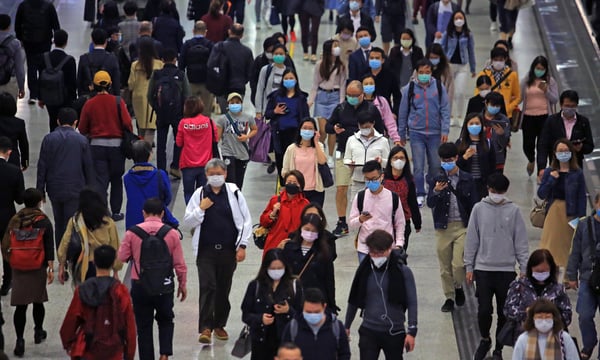In March of this year, the Hong Kong government announced its ambitions to promote the city as an AI-based data hub. The secretary for innovation, technology, and industry stated that AI would also support better information exchange with mainland China. Modernization and efficiency in public agencies are part of this technological vision, exemplified by the city’s recent adoption of a new AI tool developed locally and resembling ChatGPT.
Using technology to address policy problems has a notable history in Hong Kong. While COVID-19 is becoming a distant memory, the pandemic era yielded many insights about the impact of technology on policy. Hong Kong’s LeaveHomeSafe mobile app is an example. Required for entering most public facilities from 2020 until 2023, the app became one of the city’s most recognizable and controversial COVID-19 mitigation tools.
A survey-based study I recently published in the academic journal Social Indicators Research, co-authored with colleague Austin Aldag, canvassed more than 5,000 Hong Kong residents to investigate why some supported the app and others resisted it. The findings are applicable not only to pandemics but also to broader issues like policy legitimacy, public trust in government, and the use of technology by government agencies.
Our study shows that people’s support for the app was statistically linked with their willingness to cooperate with the government and their willingness to accept some loss of privacy for the benefit of society. However, trust in data-driven policymaking and confidence in the government’s overall response to the pandemic were not linked with support for the app. The upshot is that ideological orientation, including views about state-society relations, seemed to influence individual support for government technology.
With society moving towards a brave but uncertain technological era, several policy recommendations apply. First, oversight of the management of personal data should be thorough, reliable, and transparent. This effort can generate publicly available information about who controls personal data, how it is used, and how long it is stored. Enlisting independent or third-party organizations in this oversight can provide additional reassurance.
Second, the government must clearly communicate why given policy actions are undertaken. During COVID-19, many Hong Kong residents felt that mitigation policies were arbitrary and lacked a clear justification. The public may feel more comfortable with government policies, including technology-based interventions, if provided with clear explanations about their need and function – particularly regarding the collection and management of personal data.
Third, public support cannot be ensured only through top-down messaging. Dialogue and two-way engagement must be designed into the policymaking process, even as such efforts can be time-consuming and labor-intensive. Moving beyond superficial and after-the-fact public consultation requires a philosophical shift in how a government views its relationship with society. Soliciting public participation should not be an empty technocratic gesture but a foundation for aligning actors, institutions, and ideas around responsive governance.
Finally, it is prudent to ask how Hong Kong can leverage emerging technologies and prepare for related challenges. Given the Hong Kong government’s copious resources, tightly managed coordination capacity, and desire to satisfy central government expectations, technology will likely be used to facilitate policy intervention on almost every issue (e.g., pandemics, sustainability, and human wellbeing). However, technology goes only as far as the public accepts it. Transparency, accountability, and personal privacy should be cornerstones for any technology-based government function.
While the Hong Kong government has the capacity to quickly roll out and enforce a program like LeaveHomeSafe, technological sophistication alone is not sufficient for fostering public trust and support for policy agendas. The app may be long deleted on everyone’s phones, but its ghost lives on in the tenuous level of trust many people have in government technology. This challenge is not technical but political. Can Hong Kong be a leader in technology-enabled governance models that also satisfy public concerns and expectations? The AI era is a good opportunity for the city to excel in not only technology innovation but also its application and governance.






